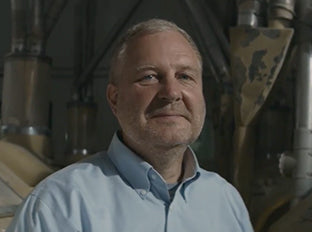From Grain To Glass is a series on Spirit of York that showcases some of the local partners we work with that provide the ingredients needed to help make our spirits. Their story is an extension of ours and we’re proud to share them #ThisIsOurSpirit If you’re looking for rye in Ontario, this is your man. Volker Storjohann is the proud owner of Brant Flour Mills (Brant, ON), and the only true rye provider in Ontario. Whether it’s whole grain or flour variety, you name it -- they got it. Given that Spirit of York only distills with rye, Volker and his family-owned mill play an integral part in helping us bring our spirits to life. “Whenever Spirit Of York first started up, I believe they bought their very first rye from us.” he said. Volker mills the rye grain used in many Spirit of York products, using grain that he sources from farmers across the country. While he predominantly uses Ontario grown grains, he also sources from Manitoba and Quebec when needed -- but all in all, 100% Canadian. This is his story:
King Of The Rye Mill
The history of Volker’s mill dates as far back as the late 1800s, when it was formerly owned by the Smith family. In the 1940s-50s, when it was called E.A Smith Flour Mills at the time, the Smith family saw a sudden demand for rye flour thanks to the influx of Europeans immigrating into Canada during that period. Located right by Ontario’s tobacco country, where farmers often times rotate their tobacco crop with rye grain, Mr. Smith jumped at the unique opportunity to mill rye in order to keep up with the growing demand of European bakeries popping by in nearby cities. This decision cemented the mill’s identity and what led it to become the primary rye grain provider in the province. “Because he did that is why our mill is still in existence today,” said Volker, who proudly continues the milling tradition today. Volker comes from a long line of millers himself, starting with his grandfather who was a miller back in Germany, followed by his own father who was a milling engineer. In the 1970s his father was given a two-year work opportunity in Canada -- a job that eventually took him to the agricultural farming community of Ontario where he first met Mr. Smith and sold him milling equipment. The two became good friends and eventually Mr. Smith presented Volker’s father an offer he couldn’t refuse -- to be partners in the milling business. That marked the beginning of a new chapter for the Storjohann family, and a bright future rooted in Ontario’s farm lands. community. Together they brought in a new electric mill in 1975 and then in 1986, Volker’s family carried on the torch and took over the milling business completely. Needless to say, Volker grew up and spent most of his childhood on the mill. He pursued a career as a mechanical engineer until his father asked him to take over the family mill in 2005. Volker took on the opportunity and proudly carries that torch to this day.
From The Mill To The Distillery
In the milling business, Volker works by sourcing grains from local farmers, and once it’s received, he cleans and processes it in order to supply a ground product that ready to use. Quality checks are constantly made throughout this process to ensure the grain always stays top quality. Volker is able to mill grain into different granulations, depending on the needs of the customer. When it comes to rye specifically, Volker notes that many distilleries can choose between a finer texture of rye or coarser one, depending on whichever makes the distilling process easier for them. With that said, he says that these days distilleries typically request finer flour types as it mashs a lot better compared to whole rye grain. This preference however, will vary from distillery to distillery. Once the rye is all prepped, the grain is packaged up and shipped off to customers -- many of which are still the European-style bakeries that made them so popular in the first place. Distilleries have become a newer customer type that Volker has seen in recent years, and one he welcomes wholeheartedly. As many start to look for local ingredients for their batches, Volker says he’s happy to be that local grain source.

